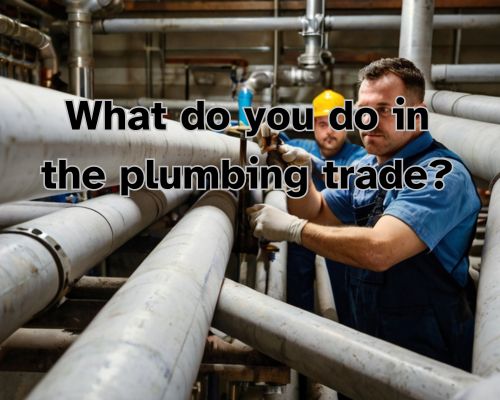If you’re interested in pursuing a career in plumbing, you’re likely wondering what exactly you’ll be doing on a day-to-day basis.

Dean Owens of Plumber Warragul highlights that “Plumbing is a trade that involves installing, repairing, and maintaining various systems related to water, gas, and drainage. This can include working on pipes, fixtures, and appliances in both residential and commercial settings.”
To become a plumber, you’ll typically need to complete an apprenticeship program, which can take several years to finish.
During your apprenticeship, you’ll learn a variety of skills related to plumbing. These include how to read blueprints, install pipes and fixtures, and troubleshoot problems. You’ll also learn about safety regulations and other important aspects of the job.
Once you’ve completed your apprenticeship, you may choose to become licensed in your state or territory in order to legally work as a plumber.
Understanding the Plumbing Trade
If you are interested in STEM and enjoy working with your hands, the plumbing trade may be the perfect fit for you. As a plumber, you will work in the construction industry, installing and repairing plumbing systems for homes and businesses.
This trade offers diverse career paths, and with the right qualifications and licensing, you can start your own business and become your own boss.
Essential Skills and Qualifications
To become a licensed plumber, you will need to complete a Certificate III in Plumbing and gain on-the-job training through an apprenticeship program.
This program includes classroom instruction and technical training, where you will learn about plumbing systems, math, and standards for the plumbing and services industry.
In addition to technical skills, you will need to have strong problem-solving abilities and attention to detail.
As a tradesperson, you will need to be able to work independently and plan your work efficiently. You will also need to have excellent communication skills to work with clients and other tradespeople on construction sites.
Diverse Career Paths in Plumbing
The plumbing trade offers a range of job opportunities, including working for a plumbing company, starting your own business, or working in technical careers such as plumbing design or inspection. You can also specialize in areas such as construction plumbing or gasfitting. With recognition of prior learning and additional training, you can also progress to a Certificate IV in Plumbing.
Licensing and Regulation
In Australia, the plumbing trade is regulated by the NSW Fair Trading regulator. To work as a licensed plumber, you will need to hold a tradesperson certificate and a construction induction card.
You will also need to comply with industry regulations and standards, such as the Plumbing Code of Australia.
If you are interested in pursuing a career in plumbing, TAFE Queensland offers apprenticeship pathways and registered training organization courses to help you gain the necessary qualifications. With the right skills and licensing, you can enjoy a rewarding career in the plumbing trade.
Working in the Plumbing Industry
As a plumber like in Plumber Warragul, you have the opportunity to work in different sectors, including residential, commercial, and industrial. Each sector has unique demands, and you can choose to specialize in one or more areas based on your interests and experience.
Residential, Commercial, and Industrial Sectors
The residential sector involves working in homes, apartments, and other dwellings. You may install, repair, and maintain water and drainage systems, gas appliances, and roof plumbing.
In the commercial sector, you may work in buildings such as offices, hospitals, and schools. You may install and maintain plumbing systems, fire protection systems, and gas appliances.
The industrial sector involves working in factories, power plants, and other industrial settings. You may install and maintain large-scale plumbing systems.
Specialisations and Advancements
As a plumber, you can specialize in different areas such as gasfitting, drainage systems, and environmental plumbing. You can also advance your career by becoming a journeyman, a supervisor, or a business owner. With experience and further education, you can also become a plumbing engineer or a plumbing inspector.
Health, Safety, and Environmental Considerations
Plumbing work involves health, safety, and environmental considerations.
You should wear appropriate personal protective equipment (PPE) and follow safety guidelines to prevent accidents and injuries.
You should also be aware of environmental concerns such as water conservation and the impact of plumbing systems on the planet.
To become a plumber, you can start with an apprenticeship or a plumbing apprenticeship program.
You will receive hands-on training and learn how to use hand and power tools, take measurements, and read blueprints.
You can also pursue on-campus or online courses to enhance your skills and knowledge.
According to the U.S. Bureau of Labor Statistics, the job growth for plumbers is expected to be 4% from 2019 to 2029.
Job openings will result from the need to replace skilled tradespeople who are retiring or leaving the occupation.
The median wage for plumbers was AUD 60,000 per year in 2020, and the award rate varies depending on the sector and the location.